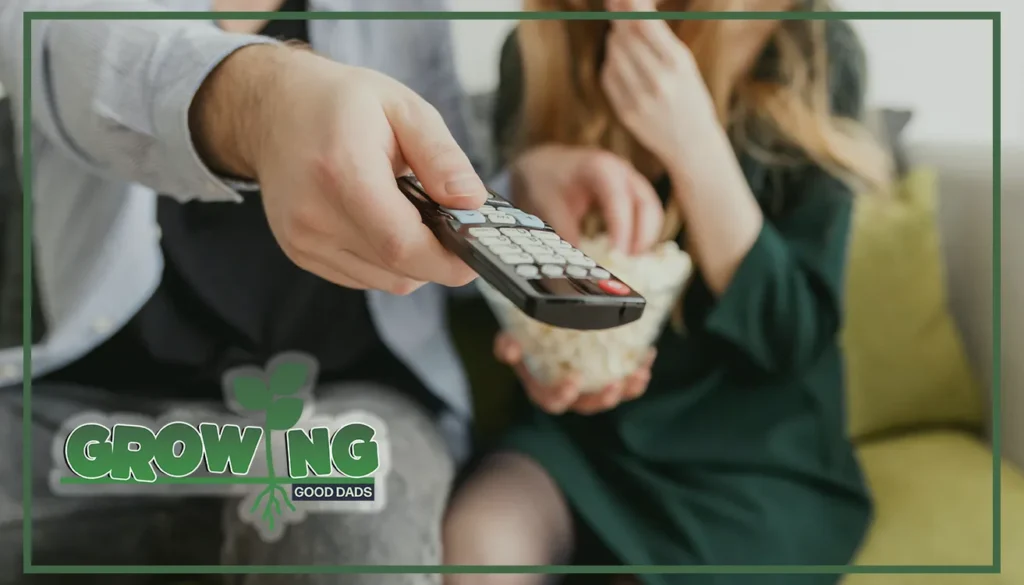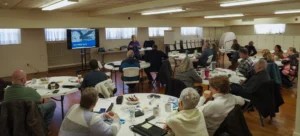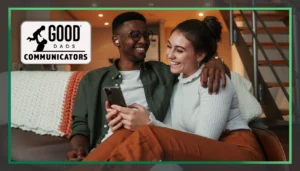At the risk of sounding like Captain Obvious, a father’s relationships with his children change as they grow up. While your youngsters once needed help tying their shoes and were wobbling on training wheels, now they’re getting driver’s licenses, dating, graduating, getting jobs and moving out.
During this time of unprecedented changes in your youngster’s life, much of the research points to the importance of role models. We know that children who have the privilege of looking up to positive and healthy adults around them are better off as they grow and enter the “real world.” This is a topic we explore in the Good Dads 2.0 course, and we think it’s chiefly relevant to this month’s theme on the Good Dads blog as we explore how to be a good dad to young adults.
Who does your young adult look up to?
This topic will be familiar to you if you’ve participated in a New Pathways class, as we spend a portion of Module 3 of Good Dads 2.0 exploring the impact of role models.
Most of us in childhood had someone we looked up to or idolized. For you, it might have been someone famous, like a celebrity, athlete or a superhero from a comic book. If you’ve ever marveled at the power and poise of the magical master Gandalf from the Lord of the Rings series or admired the devotion to justice that we see in To Kill a Mockingbird’s Atticus Finch, you know how impactful it can be to find inspiration from on the screen and on the page.
But we never really know those people, do we? We can’t truly know every intricacy of historical figures, celebrities or fictional characters—the good and bad, their strengths and weaknesses. That’s why it’s often preferable to have real-life role models: uncles, coaches or neighbors who we admire and want to be like. Sometimes these folks can also serve as mentors.
Childhood Admiration
| The Good Dads Team | Who they Looked Up to as a Child |
| Dr. Jennifer L. Baker, Founder & Director | I looked up to my dad who was very devoted to us, but as a historical figure I’d say Abraham Lincoln. |
| Denise Baumann, Director of Operations | My aunt, Deb. She was only a few years older than me, and we often shared a room when I stayed at my grandma’s house. She was fun to be around, and she always listened to us (something not all adults did). As she got older, she did well in school and went to college. I wanted to do that as well. I was disappointed when she quit work to stay at home with her kids, but as I got older, I understood the reasons why she did that and respected her decision. |
| D’Markus Thomas- Brown, Regional Director —Columbia | I looked up to my Uncle Troy and an older cousin named Michael while growing up. |
| Ana Reyes, Admin Assistant – Kansas City | My Grandma—she was the best! The nicest lady I have ever met, and she spoiled me. She had a very big heart and loved everyone she encountered. She loved life and she taught me to value it. |
| Austen Korell, Admin Assistant – Springfield HQ | I always looked up to my great grandfather. He always cared for everyone around him. He was always holding or playing with his grandchildren and great-grandchildren. He was an inventor and an engineer, and he could build anything. Every Sunday he’d have the whole family over for a potluck—but everyone on his block knew they were also invited. |
| Dora Gilreath, Communications Assistant | My older brother, Derek. I thought he was a certified genius for the longest time, and I always sought out his approval. I also looked up to the teachers I had growing up, and it’s why, to this day, I consider the possibility of becoming a teacher myself. |
| Diana Dudenhoeffer, Director of Communications & author of this blog: | Mulan, the fictional tomboy from the 1998 Disney animated movie of the same name, who assumes a false identity to enlist in the war in imperial China. |
In Good Dads 2.0, one thing becomes clear to our participants: Being a good dad is especially hard if you didn’t have a good dad yourself. That’s why it’s so important for fathers to be intentional and work to find role models for their children.
Ask yourself:
· How might I find the best people to be good influences on my sons and daughters?
· Am I hanging out with the “right crowd?”
· Who do my children look up to?
Research tells us that role models matter. If you have good role models—people who demonstrate kindness, respect and dignity in their everyday lives—you’re more likely to exhibit those same traits. But the flipside may also true. For example, the U.S. Surgeon General’s first report on youth violence back in 2001 suggested a correlation among children who are exposed to crime, violence and drugs at a young age and an increased likelihood to engage in those behaviors themselves.
While this is certainly not true for everyone—I’m not suggesting everyone who witnessed crime in their childhood is destined to commit crimes themselves—it’s still worth giving careful thought and attention to who your children admire, idolize or wish to emulate.
The people in our orbit shape our views of the world
This is true whether we are conscious of it or not. And in Good Dads 2.0, participants explore the roots of their mostly strongly held beliefs, values and truths. For example, if you’ve always believed in the moral responsibility of returning the shopping cart to the cart corral at the grocery store, the course invites you to ponder why you believe this. It’s likely an adult in your life believed the same thing and impressed this upon you during childhood.
While grocery carts are a benign example, it’s no stretch of the imagination to see how other beliefs—about masculinity, fatherhood and manhood—might be unhelpful or unhealthy. Think about who YOU consider to be a good role model for manhood and fatherhood. What traits, attitudes, habits or values do these role models have? Likewise, who does your child think is the epitome of masculinity? (I’d be remiss not to mention that this question is equally fascinating to ask both sons and daughters.)
Of course, we’re not in the business of passing value judgments, and we’re not here to decide who are the Good Guys and the Bad Guys. The point of this exercise, in the Good Dads 2.0 course and in everyday life, is to get us thinking about the people we admire and why we admire them.
Who does your young adult subscribe to?
Media matters! The media analysis and criticism classes I took in college impressed upon me this truth. What we watch and how we watch is so important. The movies and TV shows we watch, the Instagram accounts we follow, the YouTube channels to which we’re subscribed, and the books we read have real-life impacts on our perspectives, attitudes and values.
Good Dads in Movies & TV
| The Good Dads Team | Their Favorite Fictional Dad |
| Dr. Jennifer L. Baker | I don’t think he is actually fictional, but Pa in the Little House in the Prairie books was a favorite. |
| Denise Baumann | I like Frank Reagan from Blue Bloods. He’s very protective of his family, but he also had expectations of his children and holds them to that. He makes mistakes, but he admits when he’s wrong (although not always willingly) and talks about that with his kids. He’s obviously created good relationships with his children as they want his approval and his respect even though he frustrates them at times! |
| D’Markus Thomas- Brown | Philip Banks from Fresh Prince. He was always very involved in the lives of his family, and he seemed to be a protector of his family as well. |
| Ana Reyes | National Lampoon’s Clark Griswold. He is the kind of dad that wants to be the hero for his kids and family. He is a very goofy, forgetful, and awkward dad. He plans these vacations and Christmas for his family with all good intentions so he can spend time and bond with his kids. Clark is always dead-set on making everything perfect for his family despite all the mishaps and destruction that happen along the way. He never gives ups on making these memories. |
| Austen Korell | Papa Q. Bear from Berenstain Bears, the children’s picture books. He reminds me a lot of my own father. Even when he’s tired, he finds a way to help his kids. |
| Dora Gilreath | Bob Belcher from the animated sitcom Bob’s Burgers. He clearly loves his wife and kids, even if they’re odd ducks. He’s made several sacrifices for his children. One that comes to mind is when he shaved his beloved mustache (much to his wife Linda’s disappointment) so his rival, Jimmy Pesto, would let his son, Jimmy Jr., attend his daughter Tina’s birthday party. Family man and businessman, Bob wouldn’t have it any other way, and that’s what I like about him. |
| Diana Dudenhoeffer— yours truly | Hugh Jackman’s character, Charlie, in the 2011 film Real Steel. The washed-up boxer retired from the ring when robots took over the sport, but he finds a new outlook on life after reluctantly teaming up with his estranged son to train a new fighter together. Him, or Captain von Trapp from the Sound of Music. |
My advice? Talk to your young adult about who they’re watching on the internet. Who are their favorite creators on Twitch, YouTube and TikTok? Why does your son or daughter enjoy their content? If your child’s favorite influencers are tarnished by wave after wave of internet scandals, or if they make a living saying unkind things, maybe it’s time to have a conversation about good influences.





